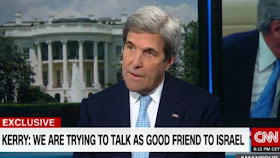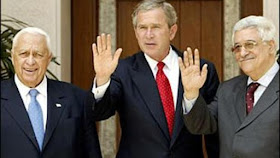Daled Amos has been blogging since 2003. He has always been insightful and does great research. (And he's a really nice guy!)
Welcome!
As of Friday, 12pm we have a new president -- President Donald Trump.
Comparisons have been made between Trump and Obama, and we can expect many more comparisons to be made over the next four years. One of those comparisons is in connection with Israel.
Obama allowed passage of United Nations Security Council Resolution 2334, calling the settlements illegal and putting renewed pressure on Israel. Now along comes Trump, who has promised -- and has reiterated his intention to keep that promise -- to move the US embassy from Tel Aviv to Jerusalem.
Yet both claim to be friends of Israel.
We know Obama is a friend of Israel -- after all, he's told us so.
There are some indications that Trump is a friend of Israel as well:
- Trump won an Israeli poll about which presidential candidate would best represent Israel’s interests
- He has won awards from the American Jewish community for his contributions to Israel and American Judaism
- He was the grand marshal of a Salute To Israel Parade
This seems to point to a basic problem that Obama had from the beginning - not just how to prove that he was a friend of Israel, but that he was the bestest friend that Israel has ever had.
Let's take one last look at Obama's relationship with Israel.
During a daily press briefing on November 17, 2009, the following exchange took place between the State Department Spokesperson Ian Kelly and Matt Lee, reporter for the Associated Press on what the Obama administration had accomplished till then in advancing peace between Israel and the Palestinian Arabs
MR. KELLY: Well, I would say that we’ve gotten both sides to commit to this goal. They have – we have – we’ve had a intensive round or rounds of negotiations, the President brought the two leaders together in New York. Look --QUESTION: But wait, hold on. You haven’t had any intense --MR. KELLY: Obviously --QUESTION: There haven’t been any negotiations.MR. KELLY: Obviously, we’re not even in the red zone yet, okay.QUESTION: Thank you.MR. KELLY: I mean, we’re not – but it’s – we are less than a year into this Administration, and I think we’ve accomplished more over the last year than the previous administration did in eight years. [emphasis added]QUESTION: Well, I – really, because the previous administration actually had them sitting down talking to each other. You guys can’t even get that far.MR. KELLY: All right.QUESTION: I’ll drop it.
One could argue that this press briefing in 2009 became the template for the drama that would play out during the next 7 years of the Obama Administration: attempts to bring peace between the two sides, resulting in failure, followed by excuses, claims of accomplishments -- and claims of friendship.
That certainly is what we recently saw in the remaining days of the Obama Administration.
During the last week of the Obama Administration, we read about how Kerry defends Obama administration’s record on Israel. During an interview with CNN’s Christiane Amanpour last Monday, John Kerry bristled at Amanpour's observation that the Obama administration was the last in a long line of American administrations that had failed to bring peace between Israel and the Palestinian Arabs. This of course was true, but instead of admitting to the obvious, Kerry placed the blame elsewhere, dividing it evenly between Israel and Palestinians:
“No, the leaders of the countries involved — one country and one entity — have failed to come to the table and reach an agreement.”
Let's save time and put aside the fact that contrary to Kerry's protestations, Netanyahu has consistently offered to sit down and negotiate directly while Abbas has refused.
So just what was Kerry arguing here? By objecting to Amanpour's comment, was he saying that Israel and the Arabs are to blame for the failure -- and therefore the Obama administration attempts at peace have been a success? Make all the excuses you want, and clearly many attempts were made by the White House over the years, but at the end of the day Amanpour was right: “yet another administration has not brought peace.”
The same John Kerry who is blaming Israel for that failure is the same John Kerry who goes on to claim that he speaks "as a good, solid best friend of Israel and we have done more for this government, more for Israel than any other administration.”
 |
| US Secretary of State John Kerry speaks to CNN on January 16, 2017. (Screenshot/CNN). Credit: Times of Israel |
Some friend.
Kerry bases his claim of friendship on the $38 billion military aid package that the Obama Administration signed with Israel and on the assistance the US has given Israel in developing Iron Dome.
For both of these, Israel is of course very grateful.
After all, $38 billion is an awful lot of money.
So is $30 billion.
On June 4, 2008, candidate Obama promised the following at an AIPAC convention (the same AIPAC convention where Obama famously declared Jerusalem "must remain undivided"):
I will ensure that Israel can defend itself from any threat - from Gaza to Tehran. Defense cooperation between the United States and Israel is a model of success, and must be deepened. As President, I will implement a Memorandum of Understanding that provides $30 billion in assistance to Israel over the next decade - investments to Israel’s security that will not be tied to any other nation.
Not only did Obama make this promise -- he also kept it.
Except that it wasn't exactly his promise to keep. Though he failed to give credit where credit was due, Obama was actually promising to implement not a Memorandum of Understanding, but the Memorandum of Understanding -- the one that George Bush signed in 2007. And yes, Obama allowed the understanding to be fulfilled, unimpeded.
So here's my question.
If we say that George Bush was a good friend because he gave Israel $30 billion -- does that make Obama, who signed off on giving Israel $38 billion, a better friend, a best friend?
That does seem to be the gist of Kerry's argument.
Giving money and weapons to Israel makes the US friends of Israel.
Allowing passage of a UN resolution calling Israeli settlements illegal and strengthening the hand of those who want to boycott Israel is apparently tough-love, and according to Kerry, was intended to "make a statement and frankly ignite a debate" -- a novel idea since the debate over settlements has long been raging in Europe, the UN and in Israel.
And yet Obama's predecessor, George Bush, was able to go beyond funding and weapons and get Israel and the Palestinian Arabs talking.
True, by the end of his administration, Bush also had not brought peace between Israel and the Palestinian Arabs.
But not for lack of trying or lack of some successes.
The Secretaries of State of both administrations made many, many visits to the Middle East. Kerry notes he logged 300 hours discussing peace with Netanyahu -- during 13 trips to Israel and 6 meetings with Israeli officials outside of Israel, while Condoleezza Rice made 25 trips to Israel and met Israeli officials outside of Israel on 2 occasions.
But more than that, in 2003, a speech President Bush gave the previous year was developed into the Road Map for peace, and it was approved not only by the Quartet of the US, UN, the EU and Russia -- but approved also by Israel and the Palestinian Authority as well.
President Bush, center, meets with Israel's Prime Minister Ariel Sharon, left, and
Palestinian Prime Minister Mahmoud Abbas to finalize the road map to peace
at Beit al Bahar Palace in the Jordanian Red Sea resort of Aqaba, June 4, 2003. AP
|
In 2007, he convened a worldwide conference in Annapolis to begin a year-long period of final status negotiations
Olmert, Abbas and Bush at the opening of the Annapolis talks
(U.S. Navy photo by Gin Kai)
|
Obama did get Abbas to meet directly with Netanyahu in 2010. After Netanyahu sweetened the deal with a 10 month settlement freeze, Abbas finally agreed to meet during the 10th month, following pressure from Hillary Clinton and persuasion from Jordan and Egypt. Abbas then insisted on another freeze before continuing, and when a frustrated Netanyahu refused, the talks broke down.
 |
Obama with Prime Minister Netanyahu and Abbas at the White House on
September 1, 2010. Reuters.
|
The bottom line, though, is that both administrations failed.
Bush, though, had the two sides talking to each other -- which was all he could really be expected to do.
Obama never got that far, and was reduced to spending his 8 years in office bragging about being Israel's friend, while giving it arms and money in a Middle East that became increasingly volatile during his term, and then stabbing Israel in the back during his last weeks in office.
We'll have to wait and see what happens with Trump as president.



